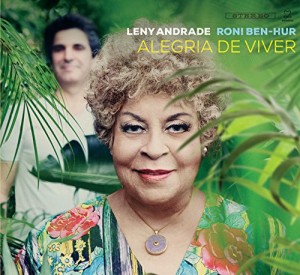Leny Andrade – Sounding Better Than Ever On “Alegria De Viver”
 Legendary singer Leny Andrade certainly belongs to the rare breed of singers who get better and better each year. Now at 72, her voice has become even deeper with an extra punch and at the same time more balmy than ever; the dark chocolate characteristics of her pipes perfectly suiting her fourteen hand-picked songs on her latest project, a duo album with magical guitarist Roni Ben-Hur who sounds like he had been the natural choice for this project since he’s capable of accompanying and following Leny brilliantly as well as supplying her with a comfortable net to balance on.
Legendary singer Leny Andrade certainly belongs to the rare breed of singers who get better and better each year. Now at 72, her voice has become even deeper with an extra punch and at the same time more balmy than ever; the dark chocolate characteristics of her pipes perfectly suiting her fourteen hand-picked songs on her latest project, a duo album with magical guitarist Roni Ben-Hur who sounds like he had been the natural choice for this project since he’s capable of accompanying and following Leny brilliantly as well as supplying her with a comfortable net to balance on.
Except maybe for “Dindi” and “Estrada Branca”, two of Antonio Carlos Jobim‘s classics, and Dori Caymmi‘s “Cantador”, most of the songs are also part of the Brazilian Standard Songbook, so to say, but haven’t been done extensively or abundantly. “Samba Iluminado”, the Fred Falcao/Marcelo Silva composition which had been recorded by Leny before, sets the pace and mood for this superb collection. Leny is a true storyteller and she sings with her heart in her throat, according to the liner notes where she also states that “I want, I like and I only accept making good music. I don’t listen to bad music, because I can’t go backwards.”
Her phrasing on Baden Powell‘s early 70s “Refem Da Solidao” is impeccable and her timing on the title track (“The Joy Of Life”) simply outstanding. With only Roni accompanying her on guitar, the focus is clearly on her majestic vocals. I’ve never heard a more convincing version of “Cantador” which is delivered with sheer beauty. The 1966 MPB classic “É Preciso Perdoar” moves along hauntingly, with much grace and melancholy. Pixinguinha‘s early MPB composition, “Carinhoso” and the Marcos Valle favorite “Passa Por Mim” (recorded for his 1965 LP “O Compositor E O Cantor”) both exude the flexibility and maturity of Leny’s performance.
Leny also includes the spanking Samba “Rugas” by Nelson Cavaquinho, who recorded his original in 1973 and which comes across as a welcome change of pace and mood. Jobim’s “Luisa” is pure drama, Clare Fischer‘s “Morning” a joyful jazzy delight from both Leny and Roni and Johnny Alf‘s exceptionally beautiful “O Que É Amar” can’t be in better hands. Or lungs.








